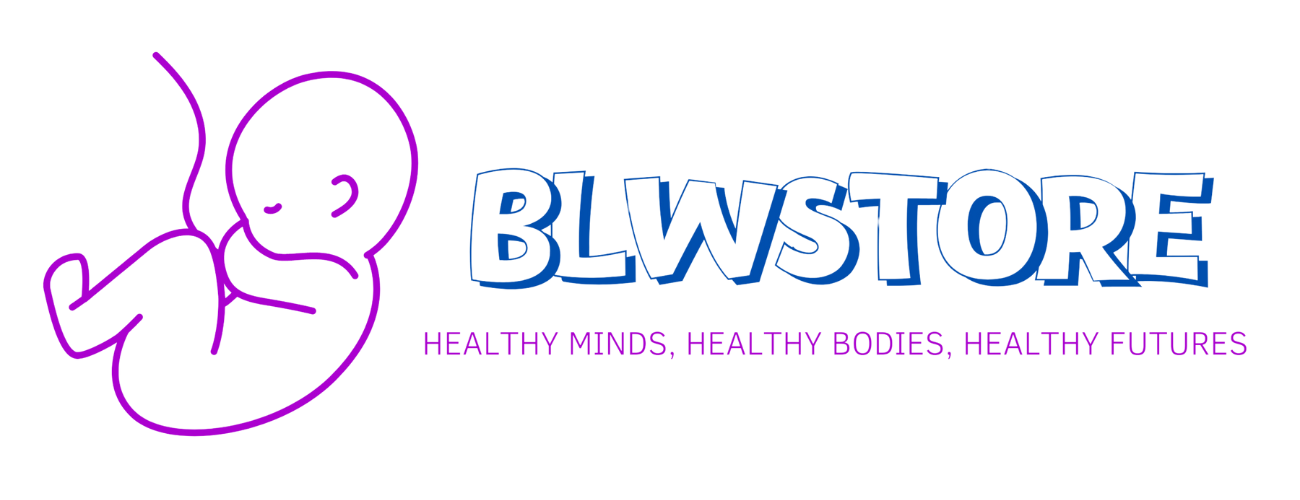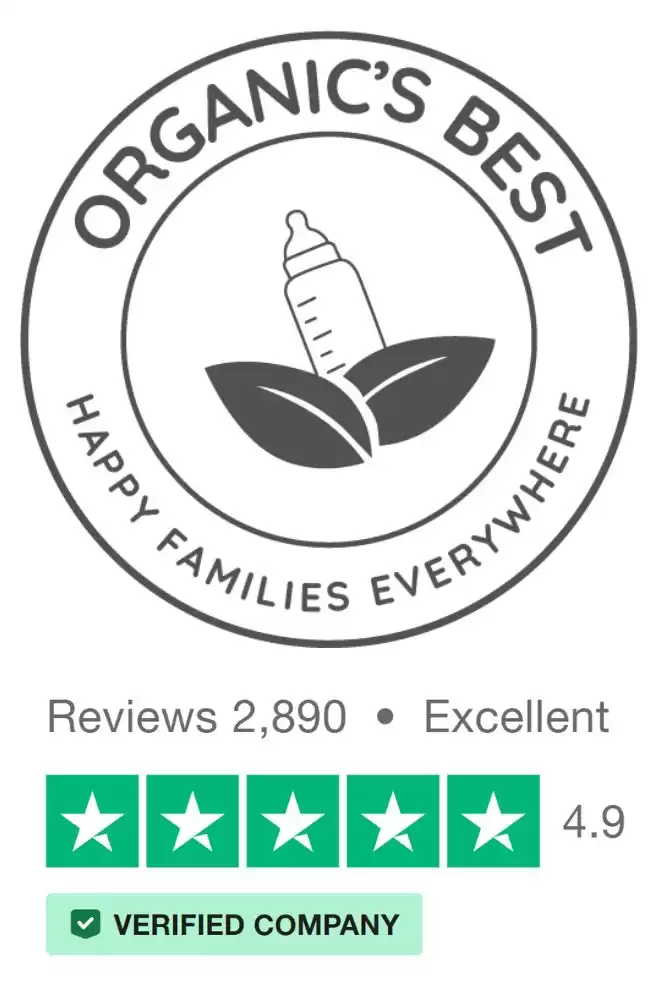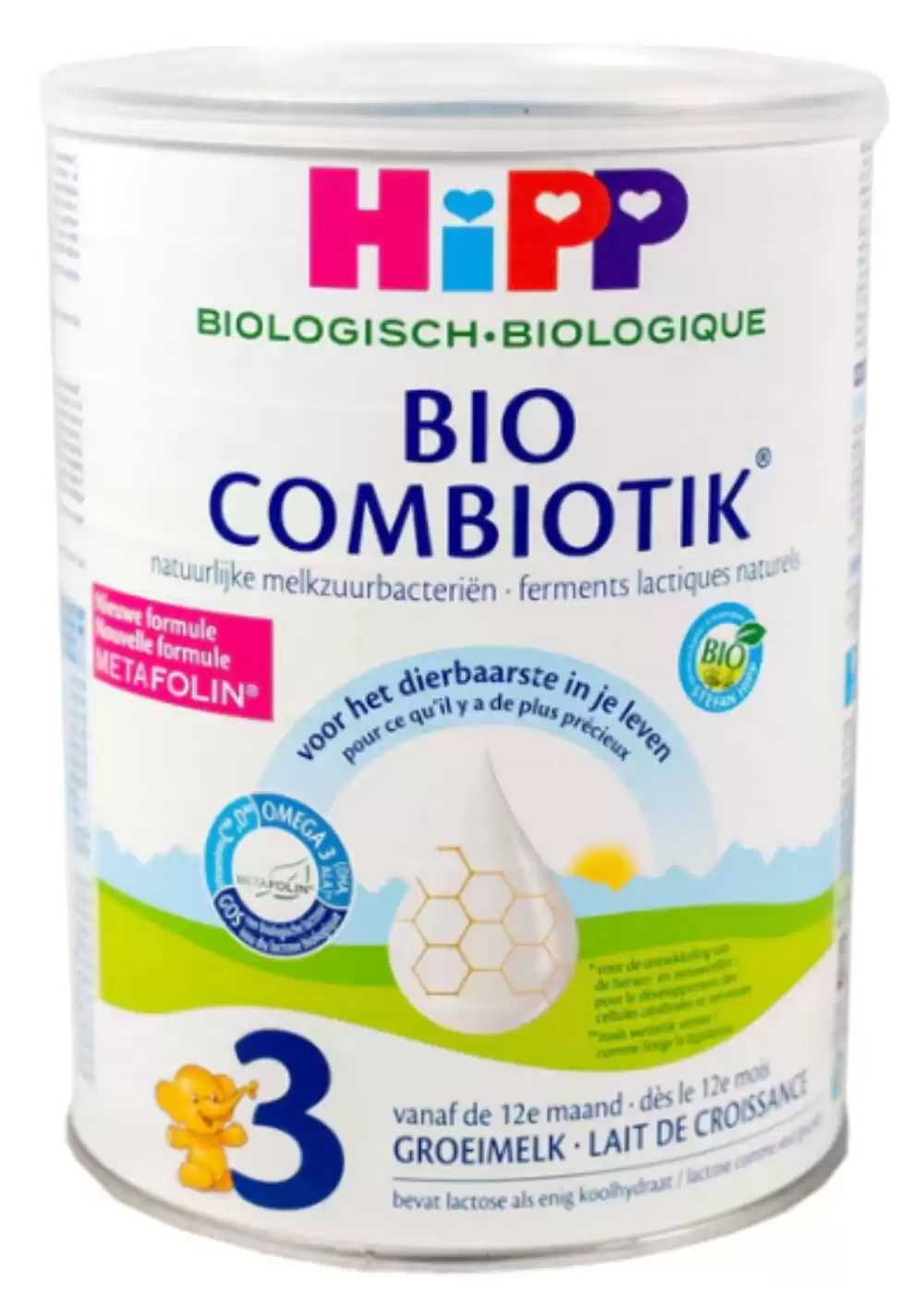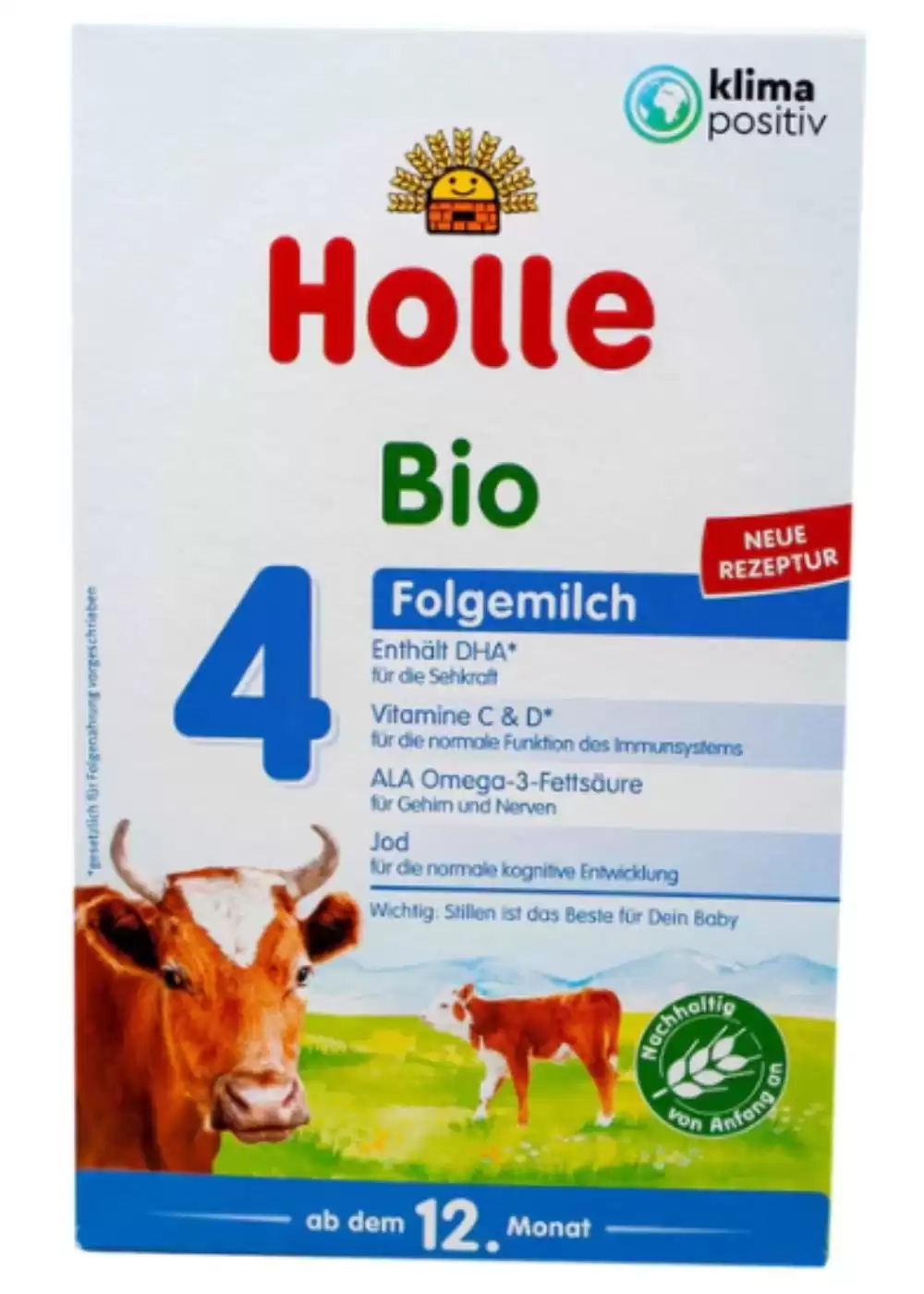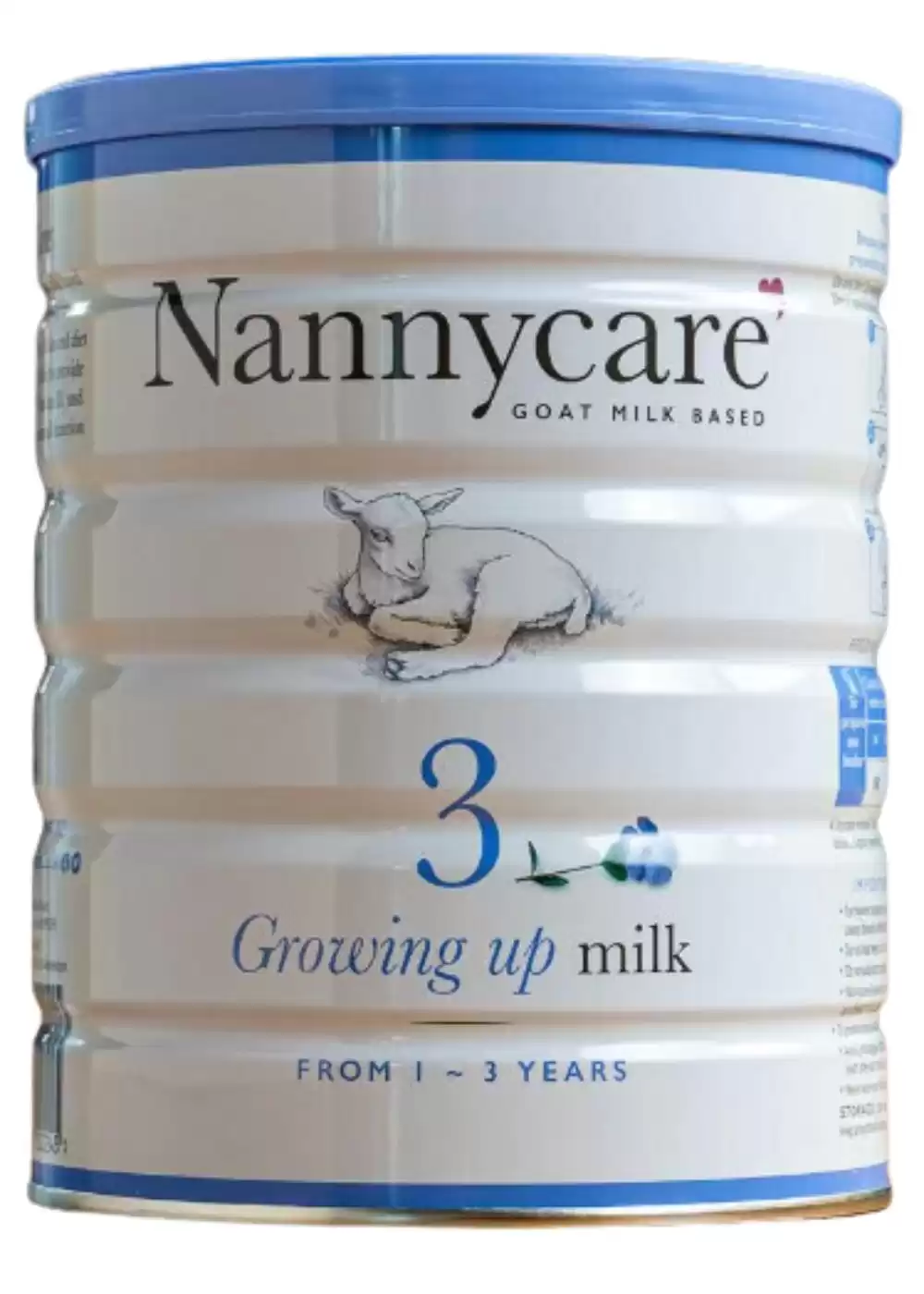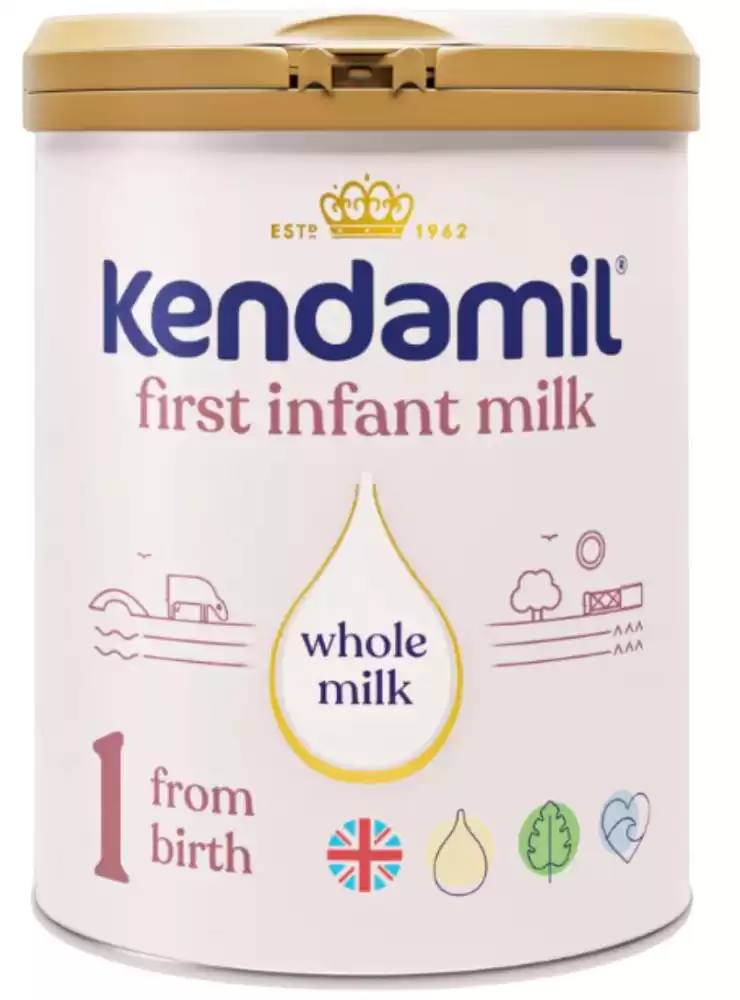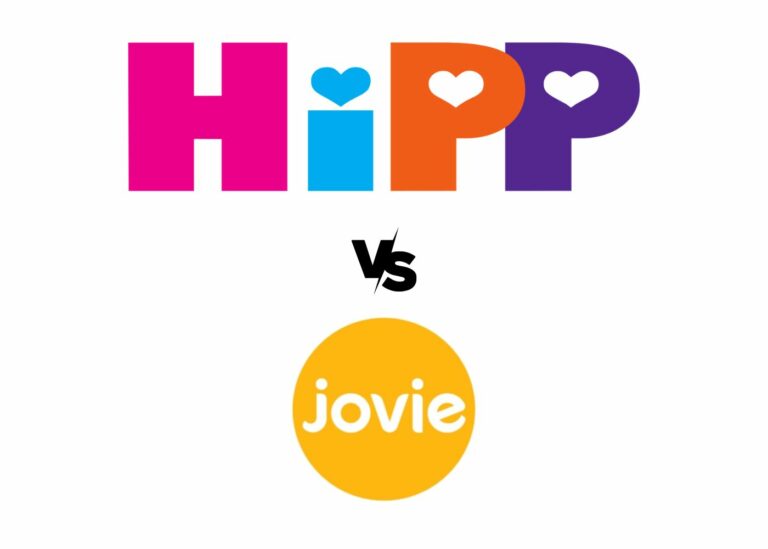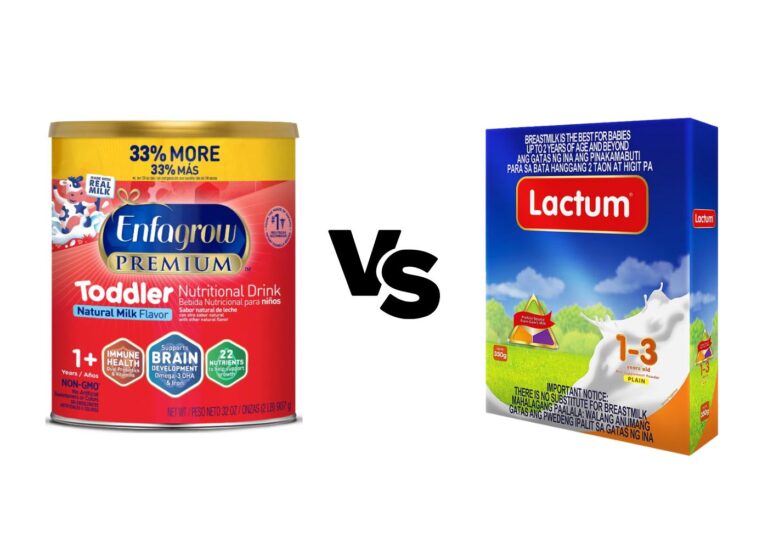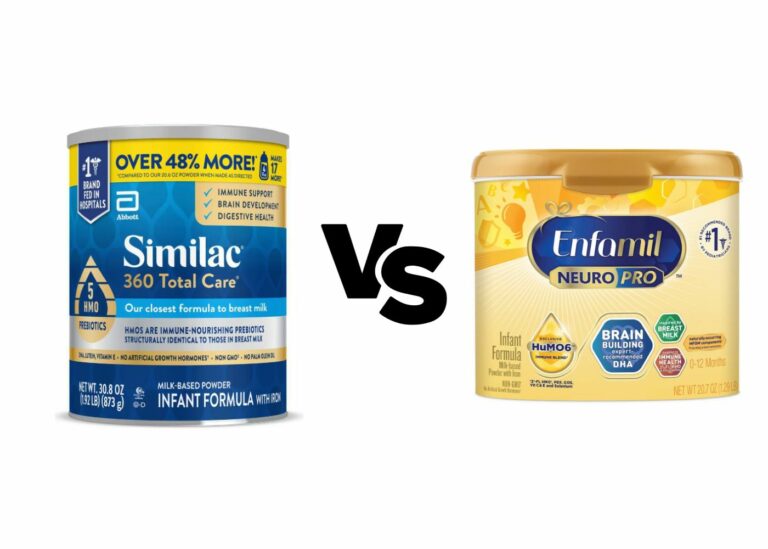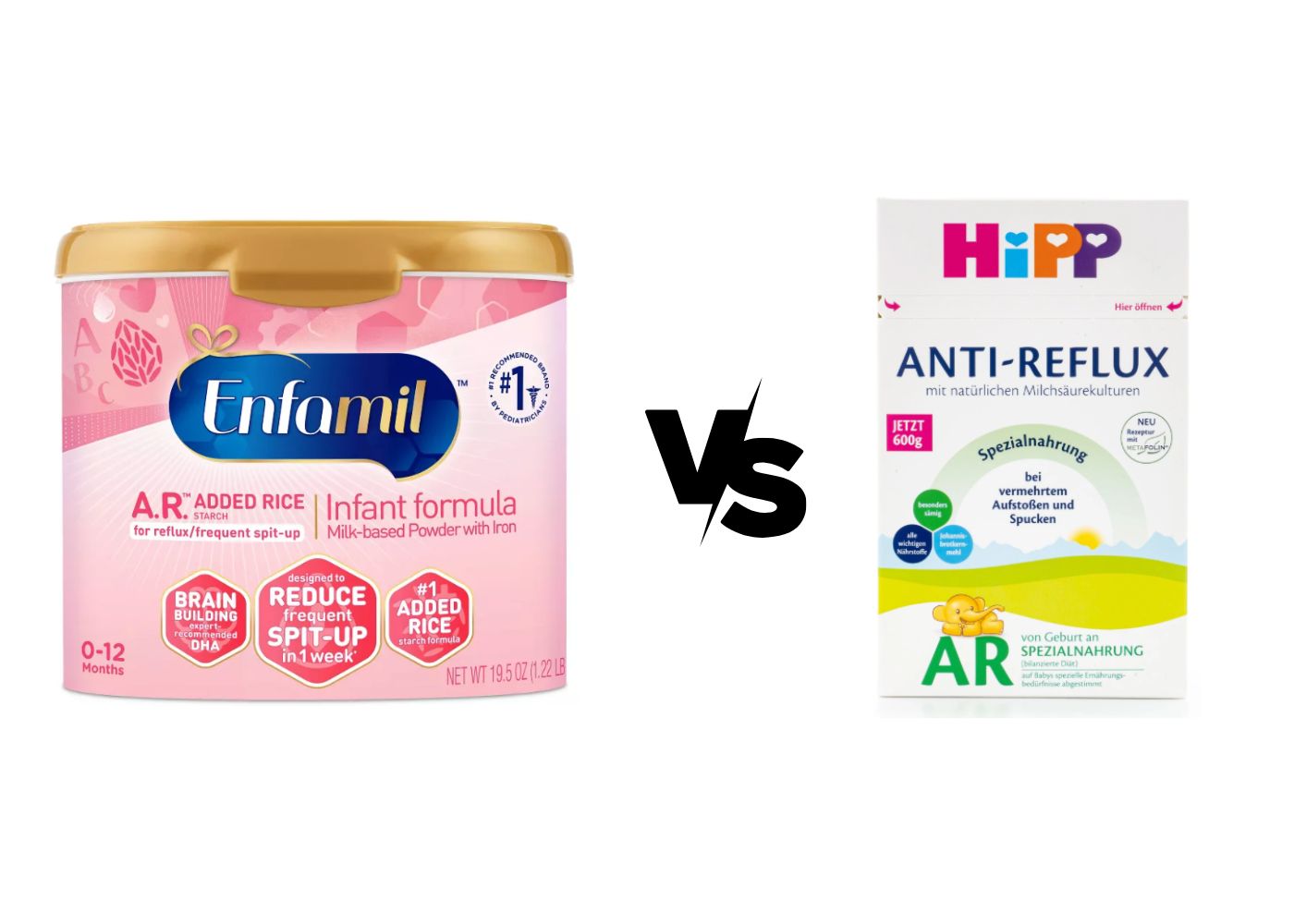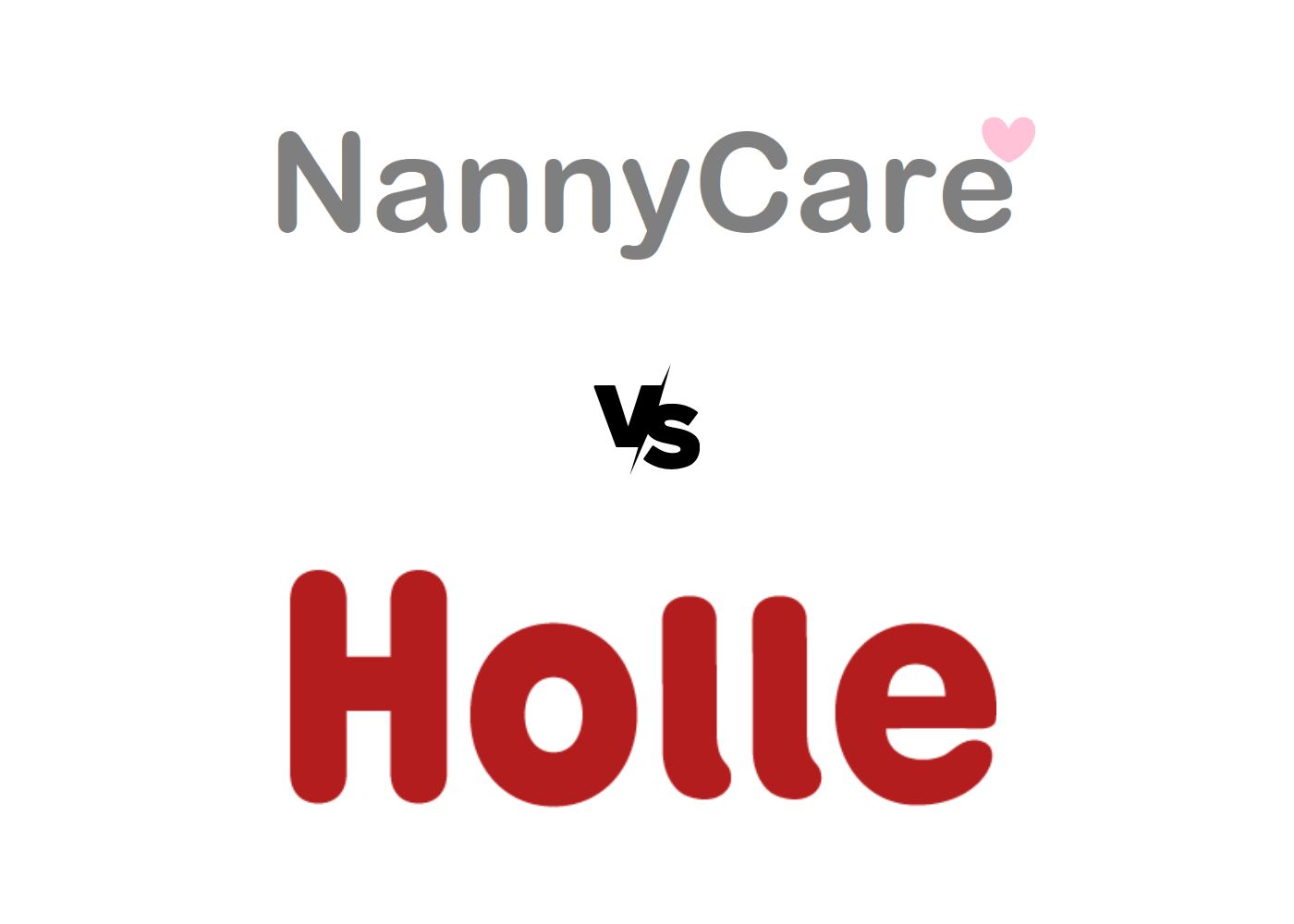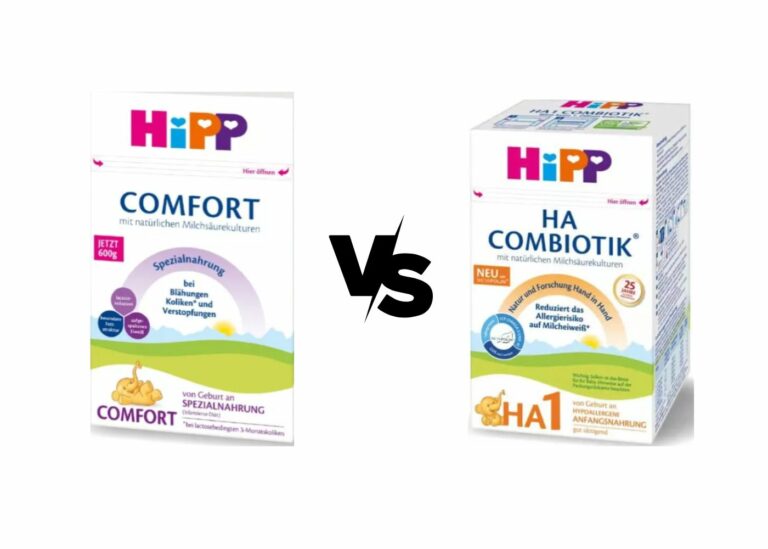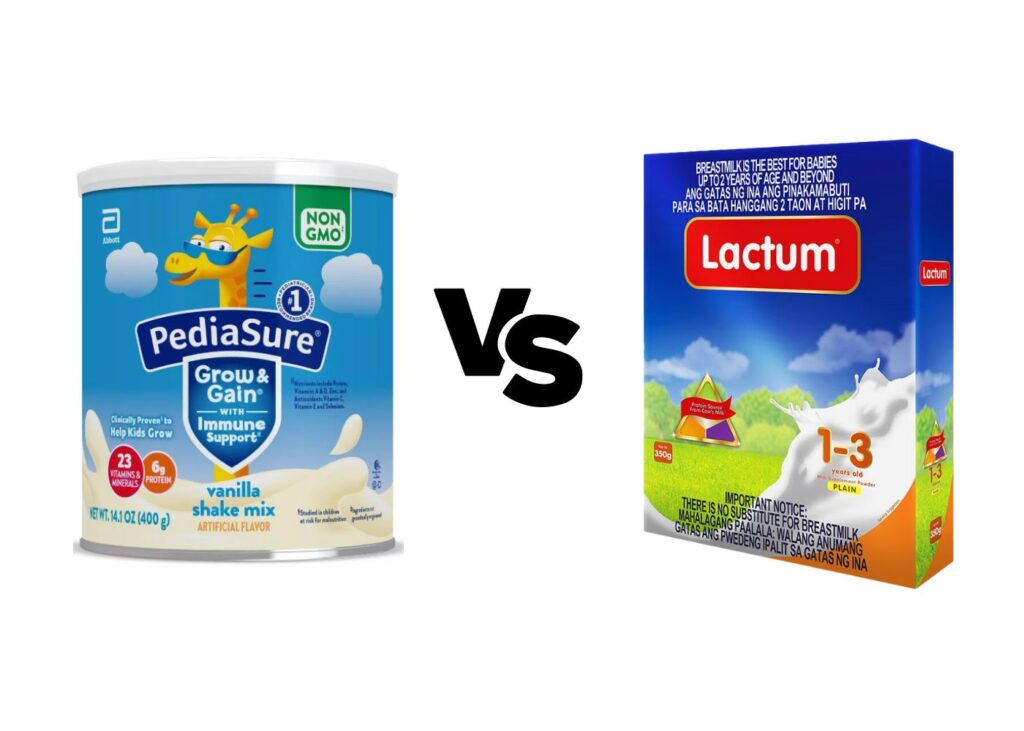
Key Differences Table Between Pediasure and Lactum
| Features/Aspect | Pediasure | Lactum |
|---|---|---|
| Protein Source | Milk protein concentrate and soy protein isolate | Nonfat milk powder |
| Carbohydrate Source | Corn maltodextrin and sugar | Corn syrup solids and sugar |
| Fats and Oils | High oleic safflower, soy, MCTs | Palm olein, soy, coconut, high oleic sunflower oils |
| Nutritional Support | 23 vitamins & minerals, 7 for immune support, 6g protein per serving | DHA for brain development, vitamins for immune support, high levels of calcium and vitamin D for bone health |
| Digestion | Gluten-free, non-GMO, suitable for lactose intolerance | Includes prebiotics for digestive health |
| Prebiotics/Probiotics | None | Galactooligosaccharides (GOS), polydextrose |
| Lactose Intolerance Friendly | Yes | No |
This article will compare two popular toddler formulas, Pediasure and Lactum.
We will analyze their ingredients and nutritional compositions to help you make the best decision for your little one.
Let’s get after it!
Related Read: Enfagrow vs Lactum
Our Short Answer
After evaluating both formulas, we’re unfortunately not comfortable endorsing either.
Broadly speaking, we wouldn’t professionally recommend either option, as there are better choices available if you’re looking for a formula for your toddler (we’ve included a list of top alternatives at the bottom of the article).
That being said, if you’re set on choosing between the two, Pediasure does edge out slightly on paper for the following reasons:
- It’s perfect for kids with lactose intolerance.
- Instead of corn syrup solids, it uses corn maltodextrin, which is lower in sugar.
- It doesn’t contain palm olein but does include MCTs (medium-chain triglycerides).
However, it’s not without its drawbacks, such as lacking prebiotics found in Lactum, though these cons are less significant than those associated with Lactum.
With over 100,000 orders delivered globally since 2019, Organic's Best offers clean, safe, and nutritionally rich formulas and snacks.
Free shipping over $100, commitment to freshness and authenticity.
- Express delivery in 2 to 5 business days
- Sourcing from European manufacturers
- Minimum shelf life of 6 months
- Climate-Controlled Warehouse
Give your little one the best start.
CODE 'BLW' for a 5% discount in all orders
Overview of the Two Formulas
Pediasure supports children’s growth and immune health, backed by clinical research for malnutrition risk. It offers 23 vitamins and minerals, 7 for immune support, and 6 grams of protein per serving. Suitable for those with lactose intolerance, it’s also gluten-free and non-GMO.
Lactum targets 1-3-year-olds, focusing on brain development with DHA, immune support via vitamins and minerals, and bone health with calcium and vitamin D. It includes prebiotics for digestion but lacks linoleic acid and folic acid, offering a unique blend of nutrients for overall development.
Pediasure
Pediasure is a well-known formula for kids’ growth and immune systems.
It stands out because it’s backed by clinical research that shows it can help kids at risk for malnutrition grow when taken as directed.
Each serving is packed with 23 essential vitamins & minerals, including 7 key nutrients for immune support, such as protein, vitamins A & D, zinc, and antioxidants (C & E and selenium).
This formula also contains 6 grams of protein per serving, which helps in muscle building.
Additionally, Pediasure is friendly for kids with lactose intolerance (though unsuitable for those with galactosemia) and avoids using GMO ingredients or artificial growth hormones. It’s gluten-free.
Lactum
Lactum is tailored for children aged 1 to 3 years and focuses on providing comprehensive nutritional support during this pivotal growth phase.
Produced by Mead Johnson Nutrition (Philippines), Inc., Lactum emphasizes brain development by incorporating DHA, an omega-3 fatty acid critical for cognitive functions.
It also aims to bolster the immune system through essential vitamins and minerals like vitamin C, E, zinc, and selenium and supports bone health with high levels of calcium and vitamin D. For digestive health, Lactum includes inulin as a prebiotic.
Despite lacking certain nutrients like linoleic acid and folic acid in some other formulas, Lactum offers choline for brain health and a unique nutrient blend including DHA, selenium, and manganese, which are important for child development.
Nutritional Composition
Pediasure uses milk protein concentrate and soy protein isolate, catering to malnutrition risks with a focus on muscle development.
Lactum relies on nonfat milk powder, a natural protein source.
Pediasure leads in carbohydrate quality and fat content, avoiding palm olein and incorporating MCTs for better digestion.
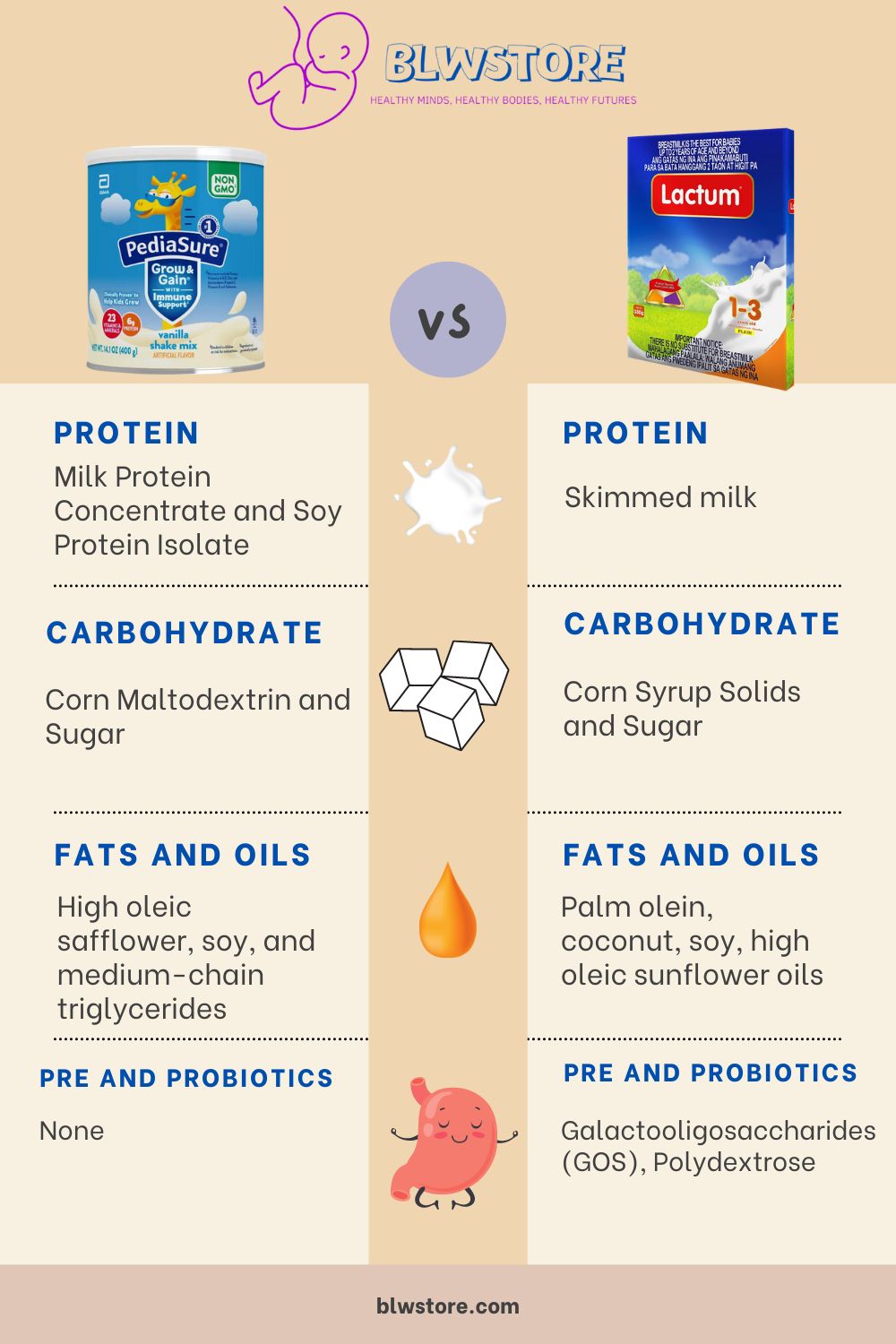
Protein Content
Pediasure: This formula uses milk protein concentrate and soy protein isolate as primary sources. The high protein content is vital for muscle development and is part of what makes Pediasure proven to help kids who are at risk for malnutrition.
Lactum: Lactum, on the other hand, is made with nonfat milk powder. Nonfat milk powder is a solid source of protein and the most used among formulas worldwide.
The key difference between nonfat milk and milk protein concentrate is their composition and purpose. Nonfat milk provides a low-fat nutrient profile that includes proteins but retains other naturally occurring milk nutrients.
Milk protein concentrate, on the other hand, zeroes in on proteins and isolates other nutrients or sugars, like naturally occurring lactose. Pediasure also adds soy protein isolate, which is protein that comes from soy. This protein has no lactose but is less bioavailable than animal-based protein.
The more natural option is nonfat milk, but if your child is lactose sensitive or intolerant, milk protein concentrate and soy protein isolate are better options.
Carbohydrate Content
Carbohydrates are essential for energy, supporting an active toddler’s daily needs.
Pediasure: The carbohydrate source in Pediasure mainly comes from corn maltodextrin and sugar.
Lactum: Lactum uses corn syrup solids and sugar as part of its carbohydrate content.
Both formulas add extra sugar, which is NOT a good thing. None of them use lactose, which is the natural carbohydrate in milk and the one kids should consume (except lactose-sensitive children).
Pediasure is one step ahead of Lactum because it uses corn maltodextrin instead of corn syrup solids. This means it has less simple sugar content, which is better.
Fats and Oils
Pediasure: Pediasure blends fats from high oleic safflower, soy, and medium-chain triglycerides. These fats are incorporated not only for energy but also as carriers for fat-soluble vitamins essential for children’s health.
Lactum: In Lactum’s composition, we find a mix that includes palm olein oil, soy oil, coconut oil, and high oleic sunflower oil. Fats play an important role in supporting neurological development and maintaining cell integrity.
Both formulas use soy oil, the worst seed oil for formulas. Pediasure does not use palm olein however, which is a good thing, since palm olein (a refined version of non-organic palm oil) has been related to poor calcium absorption. Pediasure also adds MCTs, which are easily digestible. All this information makes Pediasure the winner in fat content.
Prebiotics and Probiotics
Probiotics and prebiotics are crucial for a toddler’s health because they support the gut microbiome, which is vital for digestion and the immune system. Let’s see what Pediasure and Lactum offer in this regard.
Pediasure doesn’t mention any specific prebiotics or probiotics in its formula.
Lactum includes galactooligosaccharides (GOS) and polydextrose as prebiotics. Prebiotics like GOS are fantastic because they feed the good bacteria in your child’s gut, helping to keep their digestive system running smoothly.
What are the Best Alternatives to Pediasure and Lactum?
While Pediasure and Lactum are popular choices, there are much better alternatives that align better with different preferences, especially for parents like us, interested in more natural ingredients, organic options, or formulas that use lactose as the main carbohydrate akin to real milk.
Here are the ones we usually recommend to parents and the ones that have worked great for us and many others:
- Hipp Stage 3: Hipp is known for its excellent blend of prebiotics and probiotics that support a healthy gut microbiome. Its top-notch digestibility makes it a great choice for toddlers with sensitive stomachs.
HiPP uses probiotic lactic acid cultures cultivated from real breast milk to make a natural formulation that aids with your baby’s digestion. Stage 3 is designed with less lactose and doesn't contain whey, starch, or maltodextrin.
- EU organic certified
- No artificial sweeteners or GMOs
- Enriched with prebiotics & probiotics
- Lactose only, no starch
- Contains ARA (Omega-6) & DHA (Omega-3)
- Holle Stage 4: Holding a Demeter Certification means Holle adheres to strict biodynamic farming practices – think organic but even better. Parents who value sustainability alongside nutritional quality often choose Holle for their toddlers.
Holle Stage 4, for ages 12 months to 3 years, complements breastmilk with organic ingredients, supporting brain development and digestion with nutrients like DHA, iron, and Vitamin D.
- Demeter certified organic
- NO artificial sweeteners, flavors, GMOs or preservatives
- Gluten and soy free
- Short ingredients list
- Filling
- Contains DHA (Omega 3) & ARA (Omega 6)
- Nannycare Stage 3: Nannycare uses whole goat milk as its base. It’s an excellent source of nutrition that’s also easy on the stomach. Goat milk is naturally rich in high-quality fats and proteins and can be a great alternative for toddlers needing something different from cow’s milk formulas.
Nannycare Stage 3, from 12 months, complements breastmilk with full cream goat's milk, free from palm oil and maltodextrin, supports digestion, and is rich in Omega-3 (DHA), vitamins, and minerals for growth.
- Whole goat's milk
- Low-allergen milk protein
- Free of palm oil, whey, maltodextrin, and soy
- Contains DHA (Omega-3)
- Rich in vitamin C, D3, calcium, and iron to support growth and development
- Kendamil Stage 3: What makes Kendamil stand out is its use of whole milk, closer to natural milk’s composition. Digesting and ensuring they get natural fats can be more comforting for many toddlers.
Kendamil Classic uses a premium blend that mirrors breast milk.
- Whole Milk Base
- DHA & ARA from Marine Algae
- Prebiotic Blend
- UK Red Tractor-certified farms
- No palm oil, corn syrups or maltodextrin
- Vegetarian Friendly
Last Words
We hope this comparison between Pediasure and Lactum has helped you make the best decision for your little one.
If you have any other questions, feel free to leave a comment or contact us at [email protected].
Happy feeding!
We’re Maria and Alberto, a married couple and educators who are nutrition enthusiasts. Even before we had kids, we were already crazy about nutrition.
We’d read scientific articles, watch videos from nutritionists, and spend hours listening to nutrition podcasts.
Today, we continue doing this, but in a different way, as we’ve learned to sift through the noise and trends. Nutrition, like any other field of knowledge, the more you read and learn, the more you develop a comprehensive understanding of reality, and that’s what has happened to us.
Before having our first child, we focused on learning everything we could about child nutrition, using the same techniques we had already employed, backed by our extensive knowledge in nutrition.
Our mission is to help other parents with their children’s nutrition, to help them become the best versions of themselves.
If we are what we eat and drink, which is absolutely true, let’s do it right!
